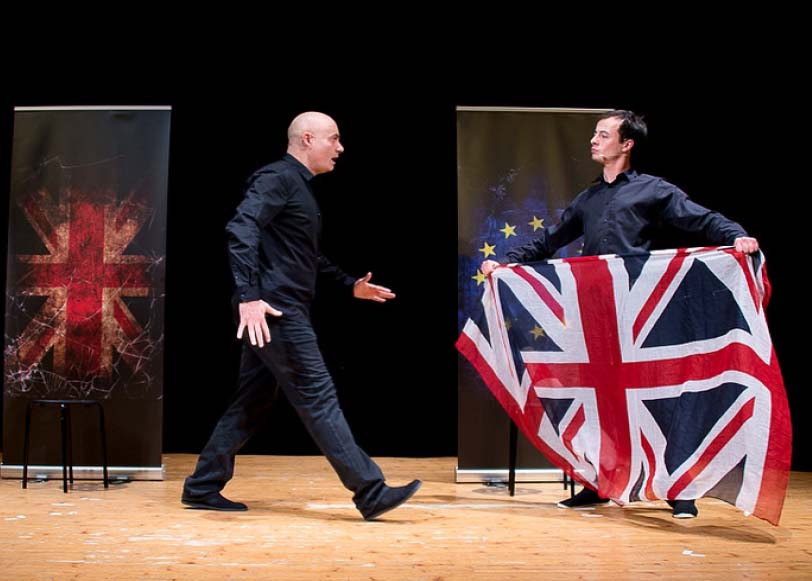As we’re about to stage our second performance here in Brighton I’m writing this final post from an undisclosed location of the city. The day seems to be blessed with a warm summer sun, people are out on the beach or sipping a drink in the many bars scattered along the seafront and I have to say I feel just about ready to have a holiday as well.
With this Brighton Fringe we’re basically wrapping up our theatre season for the show BREXIT and after a long break in June we’ll be up and about with another show in Avignon in July (more to that here)
Given that my work absorbs me almost totally, I am somehow estranged from the concept of complete summertime idleness. Being still is probably an actor’s biggest fear, especially if you’re involved in physical theatre. But like the say, ‘all work and no play makes Jack a dull boy‘ and so I usually take this time to read books and contemplate about the endless possibilities of the future. For what is the future if not, partly, the byproduct of our vision and imagination?
Now, at times, carrying out the most unstable job of the world it is easy to be overcome by all sort of fears of what the future may hold. There is an automatic tendency it seems, for our brains, to play all sort of horror movies in our head (one wonders if the daily bombardment we receive every day from the media plays a part in it).
However, if there is one thing I have learnt with the years is that the future is not as bad as we imagine it. Indeed, very often surpasses our imagination shining through with beams of lights that cut through our bleakest predictions.

And with that we’re back to those days of June 2016, during which our play is set, when the media were portraying all sort of economic disasters if Britain dared to sail off the seas solo instead of belonging to the safer pack of EU countries. As we have seen, in retrospective, some of those ghastly predictions proved to be utterly wrong, at least in the short-term.
Yet, there is the underlying feeling that some enormous challenges will have to be faced not only by Britain but by the whole European Continent in the years to come.
As the European civilization – defined by its Greek, Roman and Christian past; what De Gaulle used to call the Europe of the Cathedrals – and its cultural legacy around the world seem to be rapidly shrinking pressed by the expansion of the Chinese Empire and a resurgent Islamic presence (helped by the implacable mathematics of demography) it is easy to fall into a sort of passive pessimism.
However, think about it. How many times some of these predictions proved to be wrong? In the 1960s renowned economists predicted that the economy of the Soviet Union was to destined to overtake that one of the US. In the 1980s Japan was to become the world superpower. In the 1990s Europe was to succumb to the emerging power of Brazil and India. And if you had lived in Germany in 1946 you would probably thought that the future held no more promises of beautiful days to come.
It is true, that in the great ocean of history empires fall, civilizations disappear, languages and cultures are canceled but at the end of the day the responsibility of what happens lies also with us. Call it bind faith, dull determination, or stupid stubbornness but your future is set by what you do today and the direction your heart is set on when deciding for your actions.
In the words of Karl Popper: ‘Optimism is a duty. The future is open. It is not predetermined. No one can predict it, except by chance. We all contribute in determining it by what we do. We are all equally responsible for its success.’
Brexit is playing on 31 May to 2 June @ Rialto Theatre, Brighton
(link to the show on the Brighton Fringe website)

































